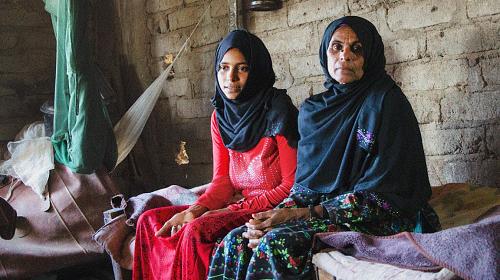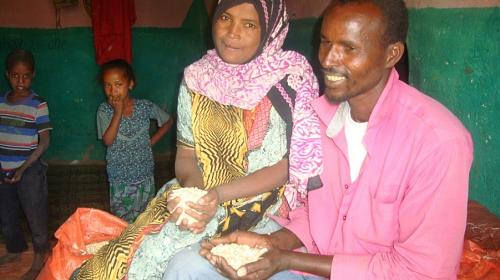
Despite the constant bombings, fighting, hunger and other difficulties most Yemenis continue to stay on in their homeland. Just over 170,000 of the estimated 22 million in dire humanitarian situation have fled to neighbouring countries. The vast majority stay on in their towns and villages, or have been forced to move to other parts of the country to avoid the bombings and destruction.
My name is Thana Faroq. I am a Yemeni street photographer; or visual storyteller as I like to call myself and my passion is telling the stories of the invisible. I recently went on a trip with CARE to Hajjah district in northeast Yemen where I met Nama who had been forced to flee her home in Saada near the Saudi Arabian border. Meeting her and the other displaced women like her had a profound effect on me. I am also a Yemeni, living under aerial strikes, but her experience made me realise how lucky I am in comparison to many.
When I met Nama my first thought was – how are so many people sleeping together? She was sharing one room with her family of around eight as well as her relative’s family. I couldn’t count all the children but I estimated there must have been nearly 20 people sharing that one room. She was one of the lucky ones – many people who don’t have relatives to help them are sleeping outside or in schools; wherever they can find shelter.
Nama and her family moved from village to village for a week trying to find somewhere they could get help and stay. Along the way they would sleep anywhere they could:
"We were sheltering under plastic sheets tacked to walls sometimes trees, we had no food no money. It seemed this was the end for us. We later moved to Bani Qa'is, seeking relatives help, but what to do if they are also devastated by the war too and they can’t afford basic stuff for themselves?”
For Nama one of the worst parts of their flight was the lack of access to toilets. “When we ran from Saada my basic human need is to use the bathroom, but when we were moving from place to place I had to do it behind a tree or wall and it was so humiliating,” she told me. Small things like this may not seem such a big deal when you think of the bigger picture. But they are. Access to a proper and safe place to go to the toilet is s a basic human right and when you’re forced to flee your home you don’t even have that. She told me how happy she was now in Bani Qa'is as CARE provided bathrooms for people.

